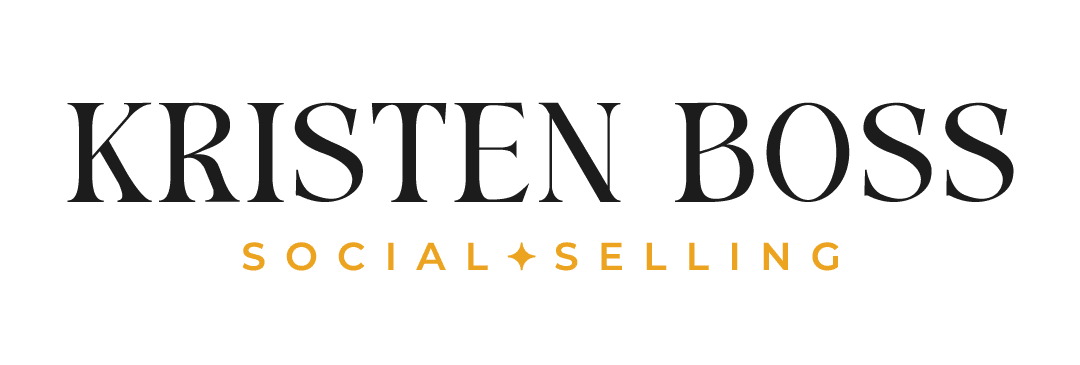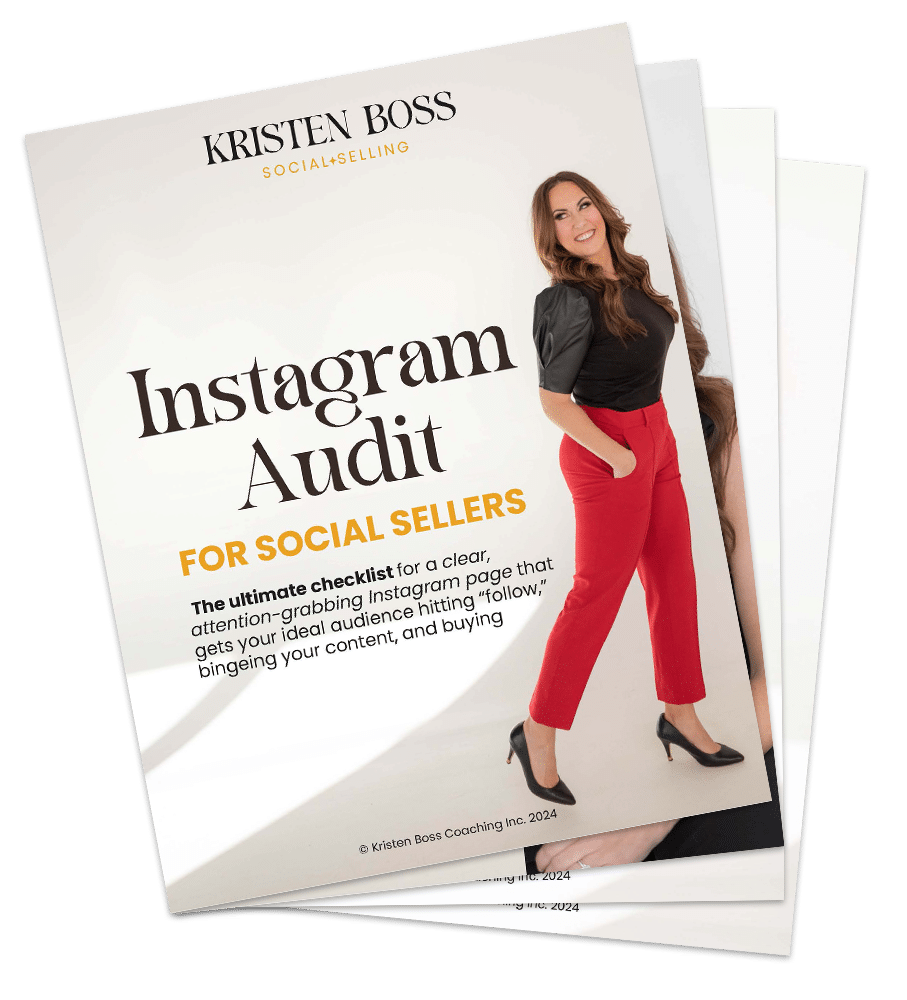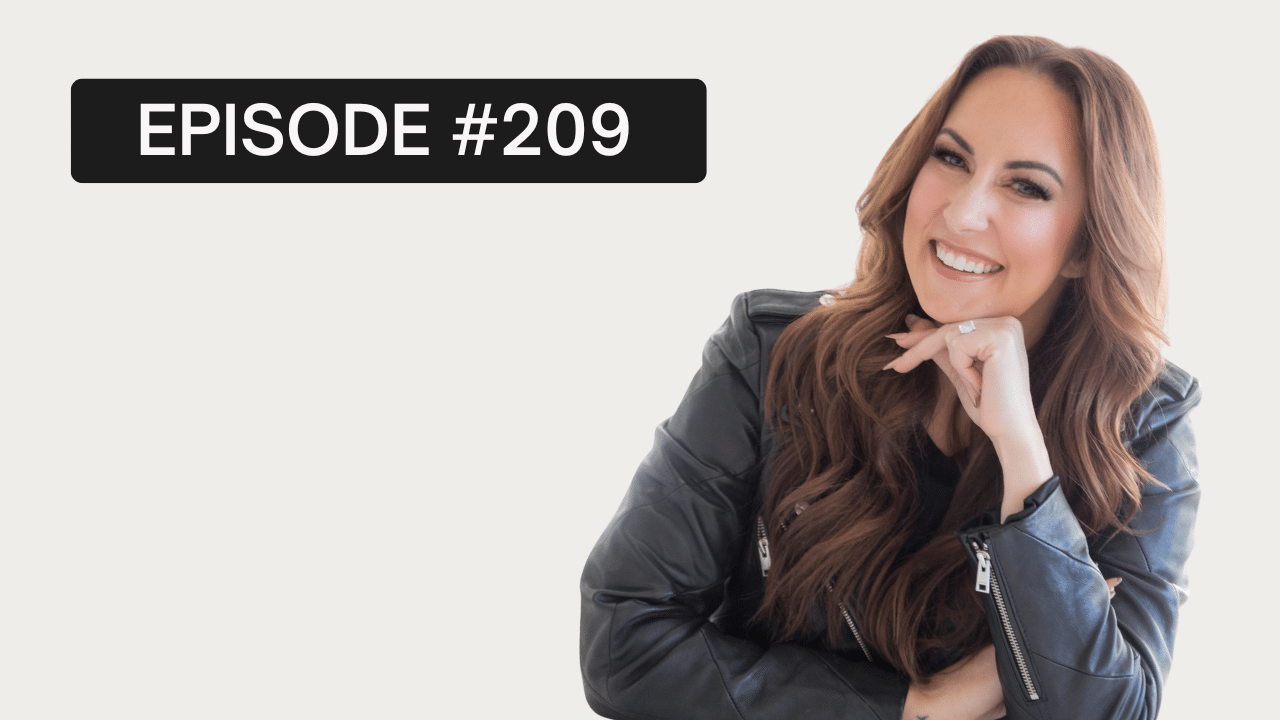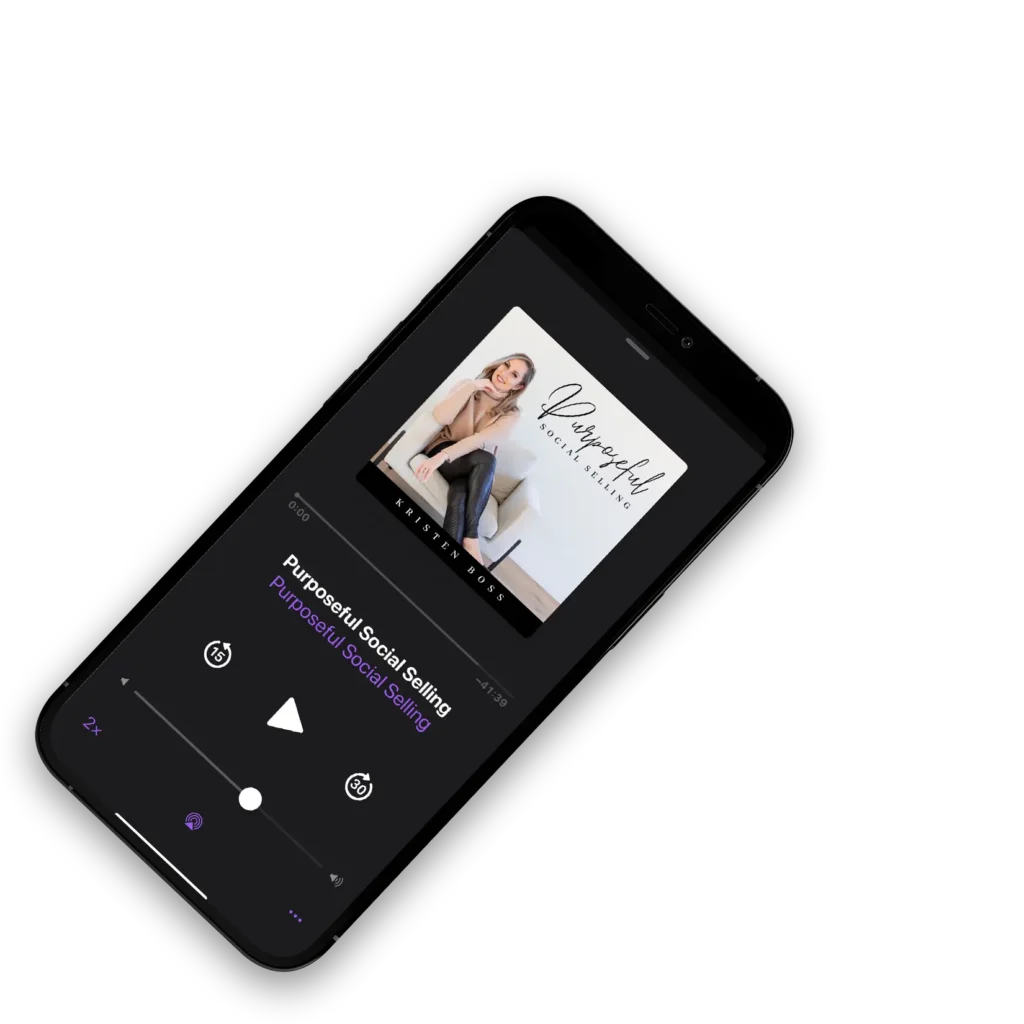How many times have you uttered the words should or need when talking about your network marketing business? I should post more, I should engage with more people. I need to hit the next rank, I need to create my systems. Have you ever noticed what feelings come up when you start with the shoulds and needs? If you’re being honest then I’m betting it isn’t all sunshine and rainbows.
The words should and need are two words Kristen thinks you can ditch, ASAP. The negative space you sit in when using these two words isn’t serving you, your team or your audience. Listen in as she explains how using should and need affects you and what it’s causing you to miss out on.
Here are some highlights:
- Why the word should invites guilt into your mindset
- How “should language” robs us of being present and feeling joy in the moment
- The connection between mom guilt and the words should and need
- The emotions that come up when saying the word need
- Why it’s important to meet your needs before your business needs in order to cut out the scarcity mindset that comes along with “I need”
It might seem silly to think that using two little words can have such a big impact on your mindset, but when you complete the thought that begins with “I need” or “I should” you can start to unravel and understand how it might be holding you back. Instead think of what you could be doing, or what you want instead of what you should or need.
Thanks for listening! Do you have a question about network marketing? Kristen can help! Drop your question here, and she just might answer it live on the podcast: https://kristenboss.com/question
Connect with Kristen:
If you’re ready to learn the simple process of running your social selling business online, you have to check out Kristen’s live group coaching program! The Social Selling Academy: www.thesocialsellingacademy.com
Do you have a business full of customers and almost no builders? You’re in need of a reboot! Learn the three skills you can learn that will completely change your recruitment game. Check it out here.
Transcript for Episode #95 Two Words to Ditch Forever:
Kristen Boss (00:05): Welcome to Purposeful Social Selling with Kristen Boss. I’m your host, Kristen Boss. I’m a mindset and business coach with more than 15 years experience in both the product and service based industries. I believe that social selling is the best business model for people wanting to make an impact while they make serious income. This is the podcast for the social seller, who is tired of feeling inauthentic in their business and desires to find a more purposeful and profitable way of growing their business in today’s social media landscape. In this podcast, you will learn what it takes to grow a sustainable business through impactful and social marketing. It’s time to ditch the hustle and lead from the heart. Let me show you the new way.
Kristen Boss (00:48): Hey friends! Welcome to episode 95 of the podcast. I cannot believe it, we are almost a hundred episodes in, and it has been a wild ride. I love coming here and serving you from week to week, giving you value. I love that. Some of you, even though you’re not in my paid programs, you see results just from implementing what you were learning in the podcast. And I love that so much. So today I wanna talk about two words that you need to ditch from your vocabulary forever. There are words that you probably use every day when it comes to talking about your business and just life in general, but I’m gonna use these words within the context of your business and how the use of those words is negatively affecting your business. Are you ready? I’m talking about the words need and should. If you find yourself often saying, I need to go make a post.
Kristen Boss (01:46): I need to be showing up consistently. I really need that rank up. I need to do this. I really need to wake up earlier. Notice how many times in a day when you’re thinking about your business, especially oftentimes I see people when they’re looking at the goal, they want to achieve start using a lot of need language around the goal. I need to wake up earlier. I need to post more consistently. I need to talk more about the business. I need to be doing these things. I need to be reaching out. I need to be following up. Need, need, need, need, need. And we’ll talk about that word and how it’s negatively impacting your business and impacting your mindset and how you are showing up in your business and why the word need doesn’t actually serve you when it comes to your business. The second word is a close relative to the word need.
Kristen Boss (02:39): And it’s the word should. We love to should ourselves. I even say this often to my friends, I say, stop shoulding yourself. It just never serves and should is when it’s like, well, I should be doing this. I should have done a better job. We can use it in the, use it in the context of past and present. I think sometimes when we’re using should language, we’re using it from a place of regret or a place of guilt. We’re saying like, I should have done better. I should have known better. I should have handled that differently. I should have responded differently. I should not have done that. And we sit in the should.
Kristen Boss (03:17): And when we’re sitting in and obsessing with the should, we’re forgetting about being present in the moment and what you could be doing right now, it’s a different posture saying I should. And I could, I want you to just notice the very subtle difference between those word choices when we use the word, should I feel like we’re often looking back at something that we can’t change now in our current circumstance like you can’t go back and change your actions. And should tends to, in my mind, when I think of it, we, it tends to be reflective. And in past tense, it stems from regret or maybe guilt or maybe shame. Were ruminating on what was and could, when we say I could, that opens up to what could be, I think could open up potential possibility. It’s a posture of openness. Like I could do that.
Kristen Boss (04:23): I’m, it’s possible for me to do that. I could explore that. Where should- it’s behind. And if I do think, if we use should when we’re talking about something in the future, I feel like that’s using obligation and guilt to propel us forward when we’re using should language of the past, it’s kind of laced in regret. And when we’re using should language for the future, it’s laced in obligation and kind of like guilting yourself. Like, I’m just gonna shame myself into this action, guilt myself into this action. And it’s almost like the, you should know better. I should be further along. Oh, think about the time you use the should for that. I should be further along. I should have more interaction. And I think sometimes when we use the word should in the present tense, like I should be paid more. I should be having experiencing more progress.
Kristen Boss (05:19): It should be easier, notice when we’re using it in that context. It’s it sounds entitled. It sounds like I’m owed it being easier for me. It shouldn’t be this hard for me. It should be easier. It’s like it’s yeah, it’s an air of entitlement. Like, it should be easier for me. I’m owed this. I’ve had so much struggle, deserve for it to be easier. That’s what we’re saying. When we say, I thought it would be further along. Not even I thought I thought, I think is an, is an okay expression, but this concept of, I should be further along invites a lot of guilt and it invites a lot of, I’m gonna say entitlement and resentment because most people when they start thinking, I should be further along, I should be making more money. I do feel like resentment starts to creep in because we’re looking at our current reality thinking it needs to be better thinking it needs to be different.
Kristen Boss (06:20): And we can’t access gratitude when we are thinking of how it should be instead of really relishing in what is, and being grateful for it. And the moment we’re like, well, I should be further along. We strip all the joy out of what’s happening in the here and now we’re unable to be present with ourselves, present with what we’ve created. And then what it does is it creates kind of this disparity between where I am and where I want to be. And it, I think it brings up a lot of impatience and urgency and frustration. I think when we say I, should it be further, it should look like this. We’re inviting frustration. That’s when I hear the should language more like that’s when I hear it the most is this. Like, I should be further along. I should be making more. I should see more interaction.
Kristen Boss (07:14): I should have more teammates. And I do think that can sound laced in entitlement like I’ve put in my work, where’s my reward. And then there’s the past tense of like, I should have done that. It’s laced in regret. We’re beating ourselves up for things. We can no longer change. And then the present tense is like, well, I’m not thankful for what’s happening now. And it should be different. And then the future tense of should is, you know, well, I should wake up earlier. I should take the time I should time block. I should ask for help. I should reach out to more people. And in that language, when we’re talking about should in the future tense, it sounds very wishy-washy. And it sounds like, yeah, I should do that. But it’s almost like we don’t complete the sentence. And if we complete the sentence, it would sound like I should reach out to people.
Kristen Boss (08:09): I should reach out to my customers and follow up with them. But I don’t want to, I think when we’re saying should it’s because we have no desire to it’s like, well, I gotta force myself to do it. And in anything that feels forced, very rarely feels fun. And I will say there are times in our business when it feels like we do need to do the things that can feel mundane, not as fun, but if it feels forced all the time, you might want to explore and revisit your why for why you’re doing this. What’s your vision. Why are you choosing to get up every day and put one foot in front of the other? Why? Because if you, if you believe, if you feel delighted to surf and you have such a clear and compelling reason to wake up and do this work, you wouldn’t have to should yourself there with guilting yourself and using wishy-washy language instead of like, I can, I will. I do. I am. Those are very affirmative declarations to speak over yourself. Its committed language should feel like wishy-washy. Yeah, but I don’t want to it’s laced in obligation.
Kristen Boss (09:29): So I want you to think about all the tenses. I said of just the word should when we use it in the past, it’s laced in regret and shame. I’m gonna fixate and ruminate on things I cannot fix and I’m gonna feel guilty and bad. That’s when I’m like, I should have done that differently. I should have answered that when using it in the past tense, present tense, it’s laced a little bit in entitlement. Like I shouldn’t be here. It should be easier. And I’m not okay with where I’m at. It’s discontentment when we’re using it in the present when we’re using it in the future, it’s laced in obligation, like I’m gonna have to force myself and I don’t want to.
Kristen Boss (10:12): And it tells me there’s a lack of desire. There’s a lack of commitment. And I feel like we oftentimes we, and I hear this just from women a lot, I feel like, especially with mom guilt, like mom, guilt lives on should and need, I should spend more time with my kids. I should give them more attention. I should do this. I shouldn’t say that. And it’s, and it’s from this place of like who I am, am and how I parent is not enough as I am. And I should be striving to do better, be better because how I am in this moment is not enough. And mom guilt lives on that. It’s that’s its fuel. And mom guilt loves to tell us, I would say, even mom overwhelm loves to tell us all the things we need to do. Let’s move into the word need and why need isn’t serving you.
Kristen Boss (11:10): I feel that need comes from urgency and lack urgency in the sense of need, meaning it can’t wait. It must be done now. And we lose a sense of what we need to prioritize. And what’s most important because we fell victim to all the needs we impose on ourselves. I need to wake up earlier. I need to do that. I need to do this. And I just want you to think of how often you’re walking around in your life day to day saying like, I need to do this. I need to do this. I should do this, but we’ll stay with need. Right? I really need to be doing this. And any time I say the word need, I feel anxious when I’m saying I need because when we need it means, we’re saying like, I’m missing something. Therefore I need something. Whereas when I want something, it’s not the belief that I’m missing something.
Kristen Boss (12:11): It’s I believe there’s so much full now and I wanna add to it. But I think oftentimes we come to our businesses with need. I need my audience to engage with me. I need my customers to reorder. I need my team to show up for me. I need to hit that rank up. I need to hit that, that bonus. I need to hit that paycheck. I need to hit my sales numbers. And when we bring that much need to our business, we become very emotionally dependent on our business. And we become very strung out when our business is not meeting those needs.
Kristen Boss (12:52): And this is why it’s so important that you first seek to meet your own needs. And you never outsource it to your business. Now you might be thinking, but Kristen, like the business pays for my mortgage and groceries. Like it is our way of life. We do need that income. And I can say that about my business. Like, yes, I need my income, but I never approach my business, this and operate in my business from that place. Because when I do that, I’m bringing in so much scarcity and urgency and lack. And when we’re in that place, it does show up in how we sell and how we market and how we lead people because we’re constantly thinking, okay, I need this to work. So that I’m okay. And what the belief is deeply rooted in is that if this doesn’t go in a certain way, I’m not okay.
Kristen Boss (13:45): I’m only okay. If the business does a, B and C, I’ll only be okay when the business does A, B and C. And the problem is you’ve made yourself conditionally, okay. You’re only okay with yourself and believing that you’re okay under certain conditions and the moment those conditions are not happening, you start to spin out like I’m okay. As long as I’m hitting my bonus, I’m okay. As long as I’m hitting my pay. And what happens is, is the moment it looks like you’re not going hit that bonus or hit that, you know, condition of if you’re okay, then what happens is you drop out of service. You drop out of abundance, you drop out of, you know, serving people. Well, and you move into your own lack and scarcity and fear. You leave trust and you drop into fear and you start operating in a way to save yourself because you don’t believe you’re safe.
Kristen Boss (14:40): You don’t believe you’re okay. And what happens is, is when you’ve, when you’ve conditioned yourself to say, I need these things. If we were to complete that sentence, it would be, I need these things because if I don’t have them, I will not be okay. I need because I’m in lack. And I won’t be okay if this need is not met, it’s okay to come to our business with wants, but to come to our business in a state of need will make for a very miserable business. So here’s what happens when you’re in this. Like I, I need. And when you’re believing that you’re only okay, as long as your business meets your needs, what happens is, is you’re going to be in survival mode and fight or flight and mode all the time in your business. And every decision you make will feel risky because it will feel like it’s about protecting yourself.
Kristen Boss (15:43): You’ll feel like you’re fighting for your safety, fighting to know you’re okay. You won’t know this on a subconscious level, but you will have a constant undertone of anxiety. And the undertone of anxiety is only there because in your mind, on some level, you’re believing I need this, and I won’t be okay without it. Whereas when you want something, when you’re serving it’s I desire this, and I want this, but I know I’m also okay. If I don’t get it, I’ll be, I’ll figure it out. I’ll make it work. I always make it work. We’ve figured it out before we can do it again. And I’m not saying like, give up your goals. I’m not saying drop the rope and give up on your goals. I’m saying to do a check-in with yourself and ask yourself, am I coming to my business with need?
Kristen Boss (16:33): Am I coming to my audience and my customers and my team with need? Or am I coming to them with want and desire and service? How you lead, how you sell, how you market will change radically when you don’t need. Need is from lack need means you lack sufficiency. It’s not, I’m not okay. And I think when we use, I think that’s why when we say I need, it feels urgent. When we say it, it feels like it’s of the utmost importance. It needs to happen. It must happen. If it, if it doesn’t happen, there’s like a or else in there somewhere like I need to, or else it’s high stakes. It feels like obligation. And it really is. And even when you’re speaking, using the word need about yourself, like I need to wake up early. I feel like that’s just laced in judgment. Come on now, get it to together. I need to, it’s like thinking I’m gonna whip myself, into shape that I need to use all obligations to propel myself forward.
Kristen Boss (17:45): I think should uses guilt to produce action. Whereas need produce ha uses urgency to produce the action and guilt and urgency are never the emotions you want to fuel your business. And your reason to show up. You want to show up from desire, like from, from a sense of importance, not urgency, but importance. Like it’s important for me to share this. It’s important for me to do this. I desire to do this. I want to do this. It’s important to me that I experience this when you use language differently. So when you’re talking about things you want to do for the sake of your goals, try on different language, try on saying it’s important to me that I wake up earlier. It matters to me that I wake up earlier. It’s important for me to do this because or so that, or I want to wake up early.
Kristen Boss (18:49): That’s a very, a different mindset than I should, and I need to, and I have to, and I should have woken up early. I should have woken up today. I should have worked out today instead of like, I want to, I desire to, it’s important for me to, I get to gosh, when you move from want to, to get to that’s when you know, you’re in full service like I get to this, that’s how I feel about this podcast. Now there are days, there are days where I’m like, I don’t wanna record a podcast. I don’t want to what there to talk about. I’m out of things to talk about. Just so you know, my brain offers me thoughts sometimes too, but this idea, but I really do the majority of the time. It really does feel like I want to. And man, I get to when an extraordinary thing I get to do you think about that all the time?
Kristen Boss (19:33): I’m like, oh, this life is amazing. I get to do this. I get to do this work for my, as a job I get to, I get to coach people and I get to hear their stories and lift them up and challenge them and push them. And I get to innovate and I get to present new ideas and I get to be a part of this amazing industry tree that I believe is about to explode even more so. And we’re about to enter into like a new, a new era of social selling. I really believe that you cannot convince me otherwise. Like we’re about, we have already started the new era and the wave of new people has not yet come to us. Think about that. Like, I want you to think of a, all the people in the world who have not yet joined this industry who are open to it, who see how things are being done. Now, they’re like, I really wanna check this out. There’s nothing but potential ahead of us, which is so exciting. And that’s why I say I get to be a part of this. I get to be a part of this amazing industry and, and the direction we’re going.
Kristen Boss (20:36): So I just wanna challenge you today to evaluate your language, catch yourself, catch yourself the next time you’re saying I need. And the moment you say I need, I want you to ask yourself. I have a, I have my chocolate lab, Hank. It’s always in the office with me when I record a podcast. And he’s literally like over here, whining in the background and I’m on a roll and I’m not gonna have my editor changes, but here’s what I’m gonna say to you, evaluate next time you say, I need. I want you to pause right in that moment and ask yourself, how am I feeling right now? Anxious, overwhelmed, pressured, desperate, afraid? Check in with yourself because it’s important that you know where the language is coming from. It’s important that you know that when you’re saying need it’s from a place of fear and we don’t wanna operate from a place of fear, that’s not the best place to operate.
Kristen Boss (21:34): Because when you’re in a place of fear, you are in a fight or flight survival response. And that is no way to live my friends, check in with yourself and ask what emotion is driving this thought. And do I want to stay in this place? Do I want to keep acting on this emotion? And on this thought, I want you to just check in next time you say need. Next time you say should really nail down what emotion is driving this language right now. And do I want that emotion to be the driver of the things I say I want. Do I want fear to be the driver of my dreams? Heck no. I want it to be courage. Do I want guilt to be the driver of how I parent? No, I want it to be love. Do I want desperation to be the driver of how I build my business? No, I want it to be service. Do I want lack to be, to be the driver of how I show up in the world? No, I want it to be from abundance and gratitude. This is why it’s so important to check in with yourself, watch yourself when you say need and should. When you do that, you’ll have a much better driver for your dreams. Do the work this week, friends, and we’ll catch you next episode,.
Kristen Boss (23:06): That wraps up today’s episode. Hey, if you loved today’s show, I would love for you to take a minute and give a rating with a review. If you desire to elevate the social selling industry, that means we need more people listening to this message so that they can know it can be done a different way. And if you are ready to join me, it’s time for you to step into the Social Selling Academy, where I give you all the tools, training, and support to help you realize your goals. In the Academy, you get weekly live coaching so that you are never lost or stuck in confusion. Whether you are new in the business or have been in the industry for a while, t is the premier coaching program for the modern network marketer. Go to www.thesocialsellingacademy.com to learn more.










